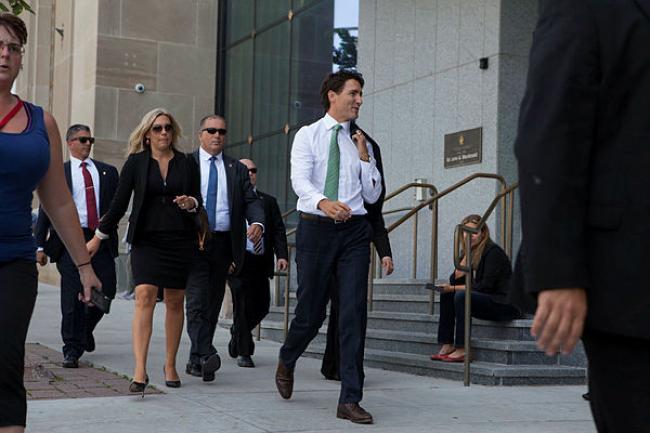Articles Menu

Trudeau spent the last campaign talking about righting the environment/energy balance. Based on the LNG decision, equilibrium between Canada's contribution to the mitigation of climate change and its energy ambitions remains as elusive as ever.
PUBLISHED : Monday, Oct. 3, 2016 12:00 AM
MONTREAL—As Liberal leader and subsequently as prime minister, Justin Trudeau has talked in the abstract of the need to secure a social licence prior to undertaking any major energy project. Until this week, no one was sure what he actually meant by that.
That changed when the federal government gave the green light to a massive liquefied natural gas project on the coast of British Columbia on Sept. 27.
Pacific Northwest LNG would entail a pipeline across the province and a terminal to export liquefied natural gas from northern British Columbia. It has been billed as the largest private-sector development in the country’s history. It is the first energy megaproject to be approved on Trudeau’s watch and it provides a tentative template for upcoming decisions on the merits of a set of controversial pipeline projects designed to bring Alberta oil to tidewater.
Here are some of the elements that went into or are missing from the mix of the social licence the Liberal government says it has found for this project:
The plan has solid support at the provincial level. B.C.’s Liberal government champions it. That stands in sharp contrast with the province’s reluctance to publicly embrace either Kinder Morgan’s or Enbridge’s plans to connect the Alberta oilsands to the Pacific Coast.
Pacific Northwest LNG has come to terms with some but not all local First Nations communities. There are serious concerns over, among other matters, the health of the wild salmon habitat. Indigenous opponents of the project are vowing to continue their battle in court.
The environmental movement is not on board. From the Sierra Club to the David Suzuki Foundation and the Pembina Institute to name just a few, organizations concerned with climate change have come down against the decision. The fact that federal approval comes with 190 conditions attached has done little to mollify them.
One of the federal conditions would see the imposition of a hard cap on the project’s greenhouse gas emissions.
But even with such a cap in place, Pacific Northwest LNG would significantly raise B.C.’s greenhouse gas output.
In a draft report released last winter, the Canadian Environmental Assessment Agency calculated that the project would be “one of the largest greenhouse gas emitters in Canada.”
If the federal government did not consider that to be incompatible with Canada’s international commitments on the climate change front, how high would the emissions generated by a project have to be for the Trudeau cabinet to find that its negative environmental impact outweighs its economic benefits?
Whether the mix that has gone into the conditional approval of the LNG project is the right one will be hotly debated for months to come.
The decision has predictably split the opposition in the House of Commons, with the Conservatives applauding the Liberal cabinet for having given the project the go-ahead but taking issue with the numerous conditions placed upon it, and the NDP and Green Party portraying the approval as a breach of trust.
At the invitation of the First Nations, the courts will be called upon to wade into the debate.
Petronas, the state-owned Malaysian energy company that leads the consortium behind the project, will have a definitive say.
The company may yet balk at some of the federal conditions. There is a glut of gas on the world market.
Notwithstanding the positive federal decision, the economic conditions may not in the end allow for Pacific Northwest LNG to see the light of day.
As of now, though, the market rather than Canada’s policy-makers will presumably determine its fate.
Tackling climate change while pursuing a policy supportive of Canada’s fossil fuel industry was always going to be a balancing act.
Stephen Harper had essentially concluded that the two were largely irreconcilable.
On his watch, the federal government made no apologies for acting as a facilitator for the industry. It purported that stance to be in the national interest.
There is no doubt that had the Conservatives been re-elected, they would have approved B.C.’s LNG project, possibly with many of the same conditions imposed by their Liberal successor.
Trudeau spent the last campaign talking about righting the environment/energy balance. Based on the LNG decision, equilibrium between Canada’s contribution to the mitigation of climate change and its energy ambitions remains as elusive as ever.
Chantal Hébert is a national affairs writer for The Toronto Star. This column was released on Sept. 29.
[Top photo:Pacific Northwest LNG would entail a pipeline across the province and a terminal to export liquefied natural gas from northern British Columbia. It has been billed as the largest private-sector development in the country's history. It is the first energy megaproject to be approved on Trudeau's watch and it provides a tentative template for upcoming decisions on the merits of a set of controversial pipeline projects designed to bring Alberta oil to tidewater. The Hill Times photograph by Jake Wright]